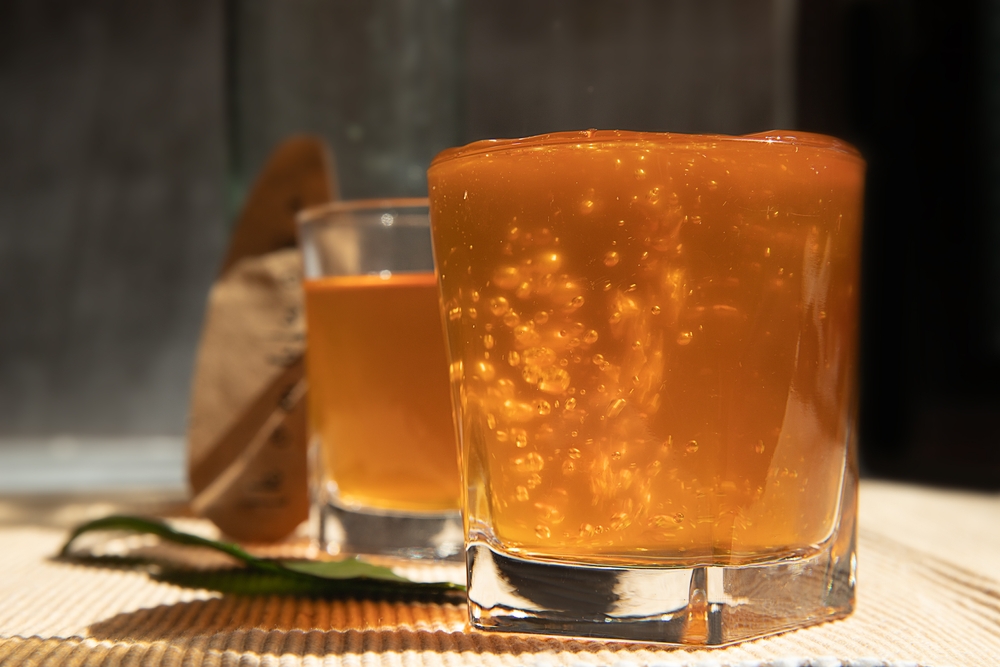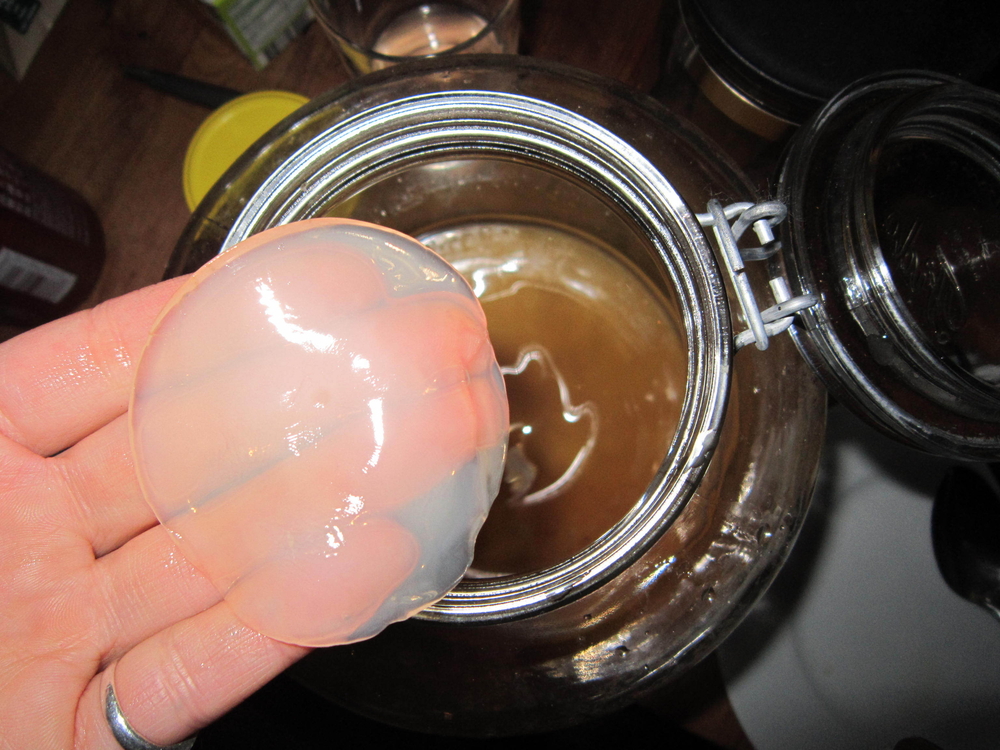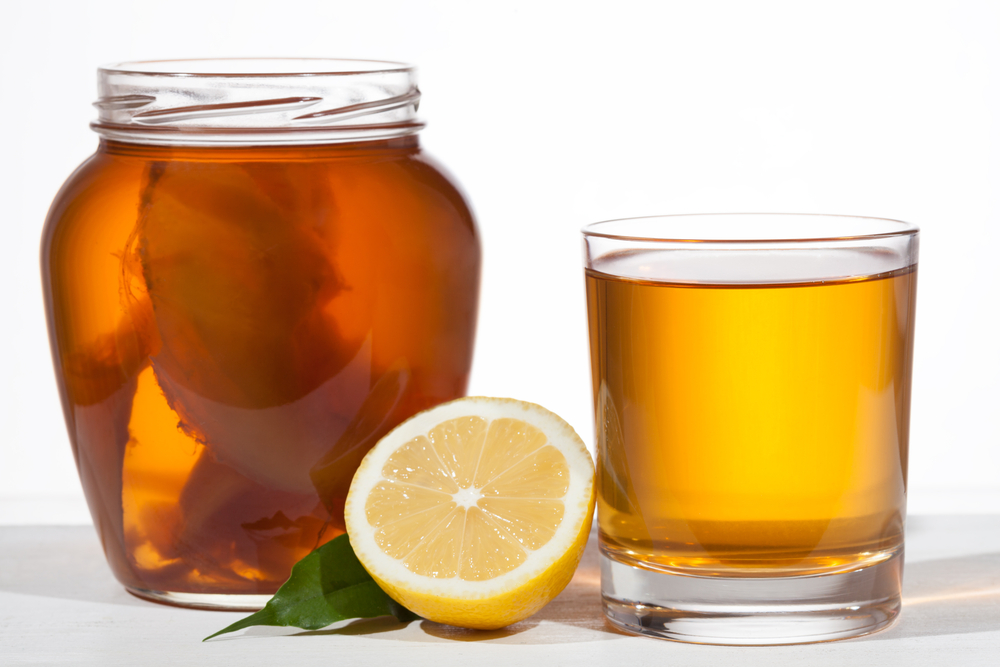Kombucha, just like yogurt, kefir, and other fermented foods, is alive! This healthy elixir is brewed with a combination of SCOBY, sweet tea, and starter tea. The SCOBY and starter tea contain live cultures that feed on the sugar of the sweet tea, enabling the fermentation process.
Table of Contents
Is Kombucha a Living Organism?
Kombucha, as an entity, isn’t a living organism like plants or humans. However, this drink serves as a playground for millions of living bacteria. It’s these bacteria that are living, breathing organisms.
The “living entity” behind kombucha is the SCOBY, the symbiotic culture of bacteria and yeast. This pancake-shaped jelly in the kombucha consists of bacteria that require sugar to survive. The starter tea used to make kombucha also contains some of these living microorganisms (which they received from a SCOBY). These free-floating microorganisms feed on the sugar for nourishment during the brewing process, similar to the SCOBY.
When the conditions are right, kombucha can grow and produce more bacteria. These bacteria form baby SCOBYs (pellicles) after kombucha sits in a fermentation vessel for a week or two.
In contrast, this symbiotic relationship can halt without enough sugar and a proper environment. These properties make kombucha tread very close to having the properties of a full-fledged, living organism.

Are There Live Cultures in Kombucha?
Yes, live cultures are present in each bottle of kombucha. These live cultures come in the form of antioxidants and probiotics and are filled with plenty of health benefits.
Live cultures help improve your digestion by boosting the health of intestinal cells. They can also balance the microflora in the gut, helping fight off harmful bacteria. Live cultures can even encourage the spawn of healthy microorganisms in the body and gut, improving your immune system.
Besides improving digestion, live cultures in this fermented drink can prevent the development of heart disease and certain types of cancer.
Are the Probiotics in Kombucha Alive?
Yes, the probiotics in kombucha are living microorganisms. They survive the journey through your digestive tract, imparting their health benefits along the way and improving gut health.
What Is the Difference Between a Live Culture and a Probiotic?
While these two terms are used interchangeably, they have a crucial difference. A live culture refers to any microorganism added to food for the fermentation process. It is not guaranteed to benefit your health in any way.
Conversely, a probiotic refers to a living organism added to food or supplements with positive health effects. For a food to be classified as a living probiotic, medical research must be conducted to support such a claim.
Does Kombucha Grow or Reproduce?
The beauty of this fermented beverage is its autonomous nature. The fermentation process enables the kombucha cultures to grow and reproduce as long as there is sugar (food) and an adequate environment.
A SCOBY and starter tea are the main drivers behind this growth. As time passes, these living cultures consume the sugar from the sweetened tea. In turn, more bacteria-containing cellulose becomes a part of the thriving kombucha environment.
When brewing kombucha, you may see some baby SCOBYs forming alongside the mother SCOBY. This is a telltale sign that your kombucha ecosystem is well-maintained and thriving.

Can Kombucha Die?
Not exactly. The SCOBY can die, meaning the fermentation process wouldn’t be successful. Because the SCOBY is the magic behind the fermentation, there is no kombucha without a SCOBY. You can keep your SCOBY living long enough to produce multiple batches by employing proper homebrewing practices.
If a kombucha, full of good bacteria and probiotics, is improperly stored, the live cultures in the drink can die.
5 Signs of a Dead Batch of Kombucha
If the SCOBY or the living cultures and probiotics in the tea have died, you may notice the following:
- The SCOBY has large black or brown streaks
- The tea smells bad
- It tastes too vinegary
- Your SCOBY is showing signs of mold
- The SCOBY isn’t growing anymore
- The tea doesn’t get fizzy even after it’s placed at room temperature
These signs are the major indicators of a bad batch. If you see any of these developments in your kombucha, it’s best to discard the entire brew, examine your SCOBY, and start fresh.

